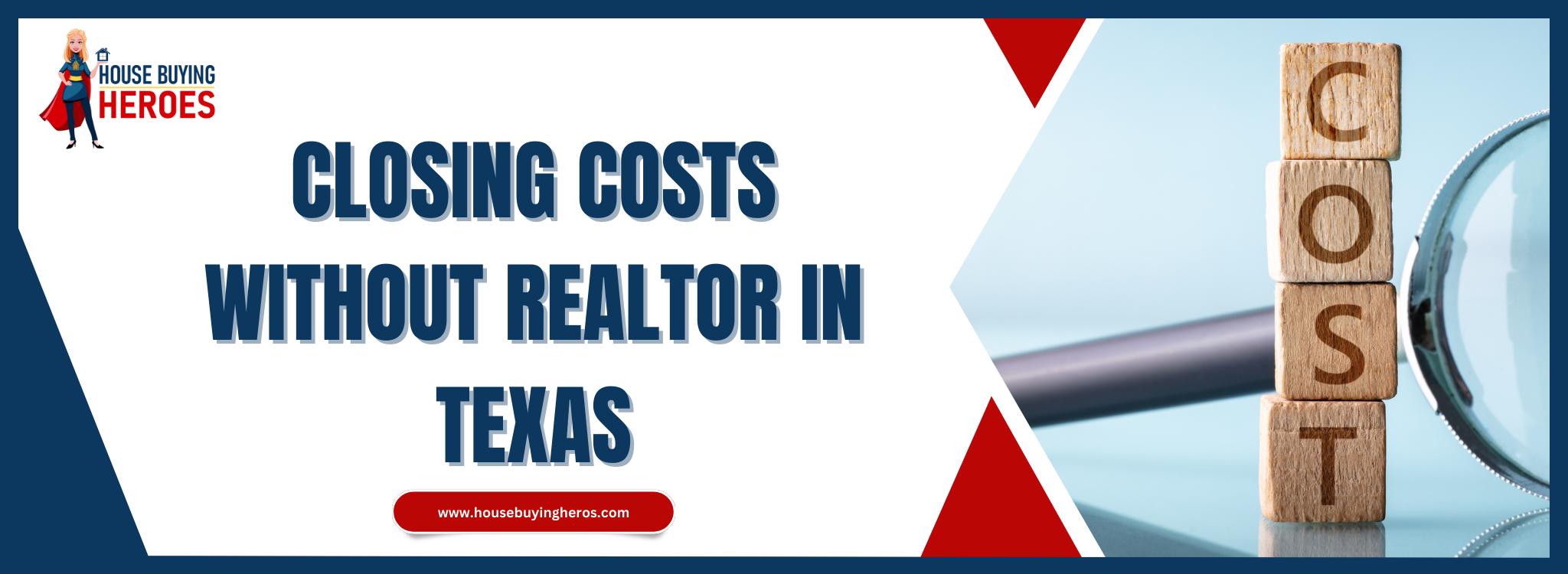
Navigating The Steps: Everything You Need To Know About FSBO And Closing Costs
Navigating the steps is important for Texas home sellers and buyers considering going FSBO. Understanding closing costs is crucial for successful sales or purchases.
First, sellers should be aware that they are responsible for paying certain fees, such as title insurance, attorney fees, and transfer tax. Buyers should plan for expenses such as appraisals, loan origination fees, and property taxes.
It’s also worth noting that these fees can vary depending on the location and specifics of the transaction. By becoming acquainted with the table of contents and all of its components, both parties can navigate this aspect of FSBO with ease and confidence.
Understanding FSBO Costs In Texas: A Comprehensive Guide

Navigating the process of buying or selling a home in Texas can be difficult, especially when it comes to knowing all of the associated costs. Those who choose to go the FSBO (For Sale By Owner) route should have a thorough understanding of the costs involved in order to avoid any surprises down the road.
In Texas, closing costs for buyers and sellers include title insurance, escrow, appraisal, and recording fees. If you choose to work with a buyer’s agent, keep in mind that you may be charged real estate commission fees.
It’s important to educate yourself on the costs and prepare accordingly to successfully complete an FSBO transaction without the assistance of a realtor.
The Cost Of Selling A House Without A Realtor In Texas: A Detailed Analysis
Selling a house in Texas without a realtor may seem cost-effective, but it’s important to consider the potential expenses. Closing costs are one of the most important to consider, as they can quickly accumulate and significantly impact your bottom line.
Title insurance, transfer taxes, and attorney fees may vary based on property location and value. Without a realtor to negotiate on your behalf, you may end up paying more for these services.
Sellers typically cover the buyer’s agent commission, which can be up to 3% of the sale price. Texas home sellers can make informed decisions about navigating the process without the assistance of a realtor by thoroughly researching and understanding all potential closing costs.
How To Calculate The Bottom Line Of Selling A House Without A Realtor In Texas

When it comes to selling a house in Texas without a realtor, one of the most important considerations is the bottom line or total cost. This includes all closing costs that must be paid before the sale can be completed.
These costs vary greatly, and sellers and buyers must accurately calculate them to ensure a smooth transaction. Texas closing costs typically include title insurance, property taxes, appraisal fees, and loan origination fees.
Attorney fees, transfer taxes, and recording fees may also need to be considered. Home sellers and buyers can confidently navigate the closing process if they understand how these costs are calculated and have a clear idea of what they will amount to.
Breaking Down Closing Costs: What You Need To Know For Selling Your Home In Texas
Many important considerations must be made when selling a home in Texas, including the various closing costs, which can quickly add up. Expenses such as title insurance, appraisal fees, and real estate agent commissions may vary depending on the property and location.
As a seller, you must be aware of these potential costs and negotiate accordingly with buyers. Furthermore, understanding the breakdown of closing costs can aid in budgeting and ensuring a smooth process for those looking to purchase a home in Texas.
You can avoid surprises and navigate the closing process more confidently if you are aware of these expenses ahead of time.
Unpacking The Concept Of Closing Costs: A Comprehensive Explanation

Closing costs are an important part of Texas’s home buying and selling process. These costs can often catch both buyers and sellers off guard, especially if they are handling the transaction without the assistance of a realtor.
It is critical to have a thorough understanding of closing costs in order to avoid surprises or confusion throughout the transaction. Closing costs are the fees and charges that must be paid at the final stage of a real estate transaction.
Typical fees include lender and appraisal fees, title insurance, and taxes. Each state has its own set of closing costs, so Texas home sellers and buyers must educate themselves about these expenses.
Unpacking the concept of closing costs will help you understand what to expect and how to effectively navigate them.
Why Buyers Are Responsible For Paying Closing Costs In Texas
Home buyers in the state of Texas are the ones who are responsible for paying the closing costs that are associated with the purchase of a property. It is possible for these costs to quickly add up, and they include fees such as those associated with title insurance, appraisal fees, and lender’s fees.
Prospective buyers must be aware of these costs and plan their budgets accordingly when contemplating purchasing a home. It is ultimately the buyer’s responsibility to pay for these costs, even though the seller might be willing to negotiate and cover some of the closing costs.
Without the assistance of a real estate agent, buyers can successfully navigate this process by first gaining an understanding of the breakdown of closing costs and then being prepared for them.
Factors That Can Influence Your Final Closing Costs When Selling A Home In Texas

When selling a home in Texas, a number of factors can affect your final closing costs. One important consideration is the type of property being sold, whether it is a single-family home, condo, or townhouse.
The property’s location is also important because closing costs vary by area. Higher sales prices often result in higher closing costs.
Furthermore, negotiating with buyers about who will cover specific fees can affect your closing costs. Other factors that can affect your final costs include any outstanding liens or taxes on the property and any necessary repairs or updates requested by the buyer during the inspection.
Sellers and buyers must be aware of these potential influencing factors when negotiating closing costs in Texas without a realtor’s assistance.
Tips For Minimizing Closing Costs When Selling Your Home In Texas
Numerous factors exist when selling a home in Texas, including closing costs. These expenses can quickly add up and significantly impact the overall profit from the sale.
However, with careful planning and strategy, there are ways to reduce these costs and keep more money in your pocket. To reduce closing costs as a seller, negotiate with the buyer on who will cover fees like title insurance or transfer taxes.
In addition, carefully review all documents and dispute any unnecessary charges. As a buyer in Texas, you can also try to negotiate for seller concessions or incentives that will help cover some of your closing fees.
Shopping around and comparing prices for services such as home inspections and appraisals is also advisable. Following these steps can save money on closing costs and avoid hiring a realtor.
Getting A Better Deal On Closing Costs With Texas United Mortgage

Working with a reputable mortgage company like Texas United Mortgage can save home sellers and buyers money on closing costs in Texas without a realtor.
Individuals who work with an experienced mortgage lender can negotiate better closing costs and potentially lower their overall expenses.
This is especially helpful for first-time homebuyers or those unfamiliar with the Texas housing market.
With the right advice from Texas United Mortgage, both sellers and buyers can confidently navigate the complex process of closing costs and achieve a better outcome.
Partnering With Top Mortgage Companies To Save On Closing Costs In Texas
Closing costs can be costly for Texas home sellers and buyers. However, working with reputable mortgage companies can help you save money on these expenses.
Working with reputable mortgage lenders can result in lower interest rates and fees, lowering overall closing costs. To find the best deal, you must conduct research and compare multiple mortgage companies.
Some lenders may offer incentives to reduce closing costs for Texas home sellers and buyers. Navigating closing costs without a realtor becomes more manageable and cost-effective when you rely on the expertise and connections of a reputable mortgage company.
The Pros And Cons Of Going Without A Realtor When Selling Your Home In Texas

Selling or purchasing a home in Texas can be difficult, especially when negotiating closing costs. Many homeowners consider not hiring a realtor.
While this appears to be a cost-saving measure, it has both advantages and disadvantages. On the one hand, not having to pay realtor fees can save you a lot of money.
Furthermore, you have greater control over the sale process and can negotiate directly with potential buyers. However, selling a home without a realtor can be time-consuming and labor-intensive.
You will also have to handle all of the paperwork and legal aspects of the sale yourself, which can be difficult for some people. Finally, before deciding whether or not to sell your home in Texas without a realtor, you should carefully weigh the benefits and drawbacks.
Exploring Alternative Options To Minimize FSBO And Closing Costs In Texas
When people in Texas buy or sell a home, closing costs are among the biggest expenses they have to pay. The total cost can add up quickly and have a big effect on everyone’s budget.
A real estate agent can help a lot of people with these costs, but there are other options for people who want to keep their costs as low as possible. Going the “For Sale By Owner” (FSBO) route can save sellers a lot of money because they don’t have to pay real estate agent fees.
Buyers can also research different loan programs and try to negotiate a deal with the seller in which they both pay some of the closing costs. To keep closing costs as low as possible in Texas, it’s important for both parties to do extensive research and know their options.
How To Negotiate And Reduce The Cost Of Selling Your House Without A Realtor In Texas

Closing costs, which can range from 2-5% of the total sale price, are one of the most expensive aspects of selling a home in Texas. Those who want to navigate these costs without using a realtor must understand how to negotiate and reduce them.
To make informed decisions, compare prices for services like title insurance, escrow fees, and transfer taxes. Consider negotiating with the buyer to share some of these costs or requesting a discount from service providers.
Consider hiring a flat fee or discounted commission real estate agent rather than a full-service realtor. By being proactive and strategic in your negotiations, you can significantly reduce the cost of selling your home in Texas without a Realtor.
Comparing Different Mortgage Companies And Their Impact On Closing Costs In Texas
When buying or selling a home in Texas, closing costs are among the most important expenses. These fees can accumulate quickly, so it’s critical to understand how different mortgage companies affect them.
When comparing mortgage companies, consider their interest rates, loan origination fees, and any other additional fees they may impose. Furthermore, some companies may offer special programs or discounts for first-time homebuyers or veterans.
Consider each company’s reputation and customer reviews to ensure a smooth and transparent process. By carefully comparing different mortgage companies in Texas, you may be able to save thousands of dollars on closing costs.
A Comprehensive Guide To Calculating And Preparing For Closing Costs Without A Realtor In Texas

Understanding and planning for closing costs is critical to buying or selling a home in Texas. However, without the assistance of a realtor, navigating these costs can be difficult and confusing.
That’s why we’ve put together a comprehensive guide to assist Texas home sellers and buyers in calculating and preparing for closing costs independently. This guide will provide you with all the information you need to confidently handle closing costs without a realtor, including understanding the various fees involved and negotiating expenses.
So, whether you’re a first-time homebuyer or an experienced seller, keep reading to learn everything you need about Texas closing costs.
Finding A Reliable Local Real Estate Agent In Texas For Your Home Sale
Navigating closing costs in Texas can be difficult without the assistance of a real estate agent. Selecting a trustworthy local real estate agent is essential for a successful home sale.
There are many agents to choose from in Texas, but not all of them may have the necessary experience and expertise to handle your transaction effectively. To find a trustworthy agent, conduct extensive research and seek referrals from friends or family who have recently purchased or sold a home in the area.
It is also a good idea to read online reviews and interview potential agents to ensure they are knowledgeable about the local market and can effectively negotiate on your behalf. By finding a reputable Texas real estate agent, you can be confident that your closing costs will be handled efficiently and transparently.
What Are Typical Closing Costs For A Buyer In Texas?
As a Texas buyer, you should be aware of the typical closing costs associated with home purchases. Appraisal fees, title insurance, loan origination fees, and escrow fees may vary based on location and property price.
Additional expenses may include surveying fees, home inspections, and property taxes. Buyers should carefully review these costs with their lender and negotiate with the seller to potentially cover some of these expenses.
Buyers who are aware of the common closing costs in Texas can better navigate the process without the assistance of a realtor.
Can A Realtor Contribute To Closing Costs In Texas?

In Texas, closing costs can quickly add up for both home sellers and buyers. These costs, which include fees for appraisals, title searches, and loan origination, can easily total thousands of dollars.
Many people wonder if a realtor can help with these costs. While it is uncommon for realtors to directly contribute to closing costs in Texas, they can play an important role in negotiating with lenders and other parties to reduce or eliminate specific fees.
Furthermore, realtors have extensive knowledge and experience navigating the complex process of closing on a home, which can save both buyers and sellers money in the long term. Individuals can confidently navigate their closing costs by working closely with a reputable realtor.
What Is The Most Seller Can Pay In Closing Costs?
Regarding closing costs, both sellers and buyers in Texas may be curious about the maximum amount a seller can pay. While there is no set limit, both parties must negotiate and reach an agreement on who will cover which expenses during the closing process.
Typically, closing costs range between 1-3% of the home’s sale price. However, this may vary based on the buyer-seller negotiations and agreements.
Both parties must clearly understand their financial responsibilities in order to navigate closing costs without the assistance of a realtor.
Can You Buy A Property In Texas Without A Realtor?
Both Texas home sellers and buyers may struggle to navigate the complex world of closing costs. Many people may wonder if it is possible to buy a home in Texas without the help of a real estate agent.
Yes, but it requires careful planning and an understanding of the process. By educating yourself on the various fees involved in closing a real estate transaction, you can save thousands of dollars and navigate this important step without the assistance of a realtor.
This guide will provide useful insights and tips for those looking to buy or sell property in Texas without the assistance of a real estate agent.
This information applies to Texas and its cities, including Irving, Palestine, and Spring. For assistance or questions, please call us at (855) 563-4376. You can also visit our website at House Buying Heros for more details.
Get An Offer Today, Sell In A Matter Of Days
More Resources For Texas Homeowners
| MORTGAGE LOAN | HOME LOAN | FIRST MORTGAGE | MORTGAGE RATES | LENDING | BROKER |
| BANKRATE.COM | BANKRATE | MLS | PREMIUM | TITLE COMPANY | VALUATION |
| PROPERTY VALUE | EDITORIAL | PAYMENT | FLAT RATE | CREDIT | MARKETING |
| HOME EQUITY | EQUITY | LAWS | CONTRACT | UNDERWRITING | HOMEOWNERSHIP |
| OWNER OCCUPIED | NAR | THE NATIONAL ASSOCIATION OF REALTORS | HOMEOWNERS ASSOCIATION | HOA | HOMEOWNERS ASSOCIATION (HOA) |
| FLOOD | ADVERTISERS | WARRANTIES | POLICIES | POLICY | OUT OF POCKET |
| OUT-OF-POCKET COSTS | HOME WARRANTIES | HOME INSURANCE | HOMEOWNERS INSURANCE | DEED | |
| DATABASE | BROKERAGES | ZIP CODE | TAX RATE | RISK | REAL ESTATE TRANSACTIONS |
| UTILITIES | OWNERSHIP | MORTGAGE INSURANCE | GOAL | FINANCING | FACT-CHECK |
| FACT-CHECKED | DOWN PAYMENT | DISCOUNT POINTS | MORTGAGE POINTS | CREDIT SCORE | CREDIT CHECK |
| CREDIT REPORT | CONSUMER | CALIFORNIA | AVERAGE | ACCURACY | TOOL |
| TAX-DEDUCTIBLE | TAX DEDUCTIBLE | SUBJECT MATTER EXPERTS | SUBJECT-MATTER EXPERTS | DISCOUNT BROKERAGES | DISCOUNT BROKER |
| SOCIAL MEDIA | SAVINGS | REFINANCE | RE/MAX | PHOTOGRAPHERS | PAINT |
| BPO | MONEY MARKET ACCOUNTS | MONEY MARKET | MARKETPLACE | PRIVATE MORTGAGE INSURANCE | LAWSUIT |
| INSURANCE POLICY | INCOME | HOME EQUITY LOANS | HELOC | EXPERTS | PERKS |
| BORROWERS | CREDIT CARD | CONFIDENCE | CARET | CALCULATOR | BLOG |
| BANKING | A HOME INSPECTION | CAN HELP YOU | IT CAN BE | YOUR REAL ESTATE | IN TEXAS HOW |
| A REAL ESTATE ATTORNEY | MUCH ARE CLOSING COSTS | COSTS IN TEXAS HOW | WHO PAYS CLOSING COSTS | ARE CLOSING COSTS IN | IN TEXAS REAL ESTATE |
| YOUR REAL ESTATE AGENT | REAL ESTATE AGENTS ARE |


